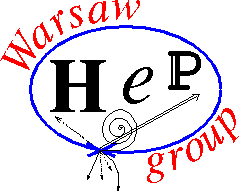SEMINARIUM FIZYKI WIELKICH ENERGII
Dnia 30 maja (piątek) o godzinie 11:30, w sali B2.38 odbędzie się seminarium, na którym zostanie wygłoszony referat pt.:
„Long-Lived Particle Searches at a Future Higgs Factory with the ILD experiment”
Referuje: mgr Jan Klamka (IFD UW)
Future e+e– colliders provide a unique opportunity for long-lived particle (LLP) searches. I will present a full simulation study of LLP searches using the International Large Detector (ILD), a detector concept for a future Higgs factory, with a gaseous time projection chamber as its main tracking device. Signatures of displaced vertices and kinked tracks are explored. Challenging final states involving both very soft displaced tracks and boosted, nearly collinear tracks have been studied. Backgrounds from beam-induced interactions and other Standard Model processes are considered. Expected exclusion limits will be presented for a model-independent analysis, as well as for Higgs boson decays to LLPs, for a range of LLP lifetimes.
Serdecznie zapraszamy
dr hab. Katarzyna Grzelak
prof. dr hab. Aleksander Filip Żarnecki

